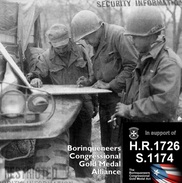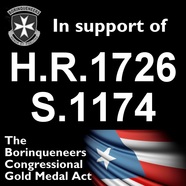The 65th Infantry Regiment Borinqueneers:
|
"Simply put, the 65th Infantry Regiment Borinqueneers are the Latino-American equivalent of the famed Tuskegee Airmen and Navajo Code Talkers. The Borinqueneers must be recognized in like fashion with the Congressional Gold Medal, & take their rightful place in American history NOW!" |
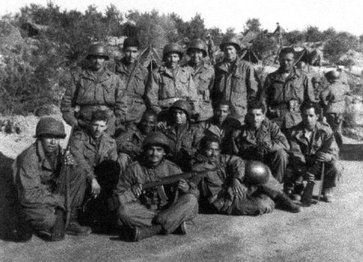 65th Inf. Reg. Co. B Weapons Platoon in Korea, 1950.
65th Inf. Reg. Co. B Weapons Platoon in Korea, 1950.
New Co-Sponsors of bill H.R.1756 in the US House of Representatives have put the Borinqueneers Congressional Gold Medal Alliance (BCGMA) at 301 or 104% of the 290 Co-Sponsors needed to further the House version of the Borinqueneers Congressional Gold Medal Act, the alliance reported on April 20th.
The U.S. House of Representatives bill was introduced this spring by Representatives Pedro Pierluisi (D-PR) and Bill Posey (R-FL).
The U.S. Senate companion bill, S. 1174, was introduced in June by Sen. Richard Blumenthal (D-CT), and has 53 of the necessary 67 Co-Sponsors.
This type of legislation requires two-thirds of the membership of each chamber of Congress to become Co-Sponsors for possible passage of the bills. All necessary, remaining U.S. Senate Co-Sponsors must be secured as early as possible in 2014, and additional Congressional protocols must be completed for passage of the bills before the end of 2014, or the bills will disappear.
Similar in nature to the famed Tuskegee Airmen and other segregated U.S. military units, the 65th Infantry Regiment Borinqueneers were the largest, longest-standing, and only active-duty segregated Latino military unit in U.S. history.
Like the Tuskegee Airmen, Navajo Code Talkers, Nisei Soldiers, and Montford Point Marines who’ve already been recognized with the Congressional Gold Medal, the Borinqueneers overwhelmingly distinguished themselves in battle all the while enduring the additional hardships of segregation and discrimination.
Hailing from Puerto Rico, the US Army unit was active from 1899-1959. Emblematic of all US military veterans, including the hundreds of thousands of Latino-American veterans, the Borinqueneers served and sacrificed in the cause of freedom with great pride The youngest of these remaining Latino-American heroes are in their 80’s and 90’s, having served in World War II & the Korean War.
A nationwide, non-partisan, all-volunteer group, the Borinqueneers Congressional Gold Medal Alliance has been advocating the awarding of the Congressional Gold Medal to these elderly veterans since late last year. Made up of veterans, Latino-Americans, and like-minded patriots, the organization has worked closely with members of the U.S. Congress to facilitate the successful introduction and subsequent support of this special bipartisan legislation.
The alliance’s national chair, Frank Medina, a 2002 West Point graduate and Iraqi war Veteran, is coordinating intense efforts this winter to encourage individuals and organizations to reach out to additional Members of Congress, especially Senators, to request their Co-Sponsorship of the bills.
The U.S. House of Representatives bill was introduced this spring by Representatives Pedro Pierluisi (D-PR) and Bill Posey (R-FL).
The U.S. Senate companion bill, S. 1174, was introduced in June by Sen. Richard Blumenthal (D-CT), and has 53 of the necessary 67 Co-Sponsors.
This type of legislation requires two-thirds of the membership of each chamber of Congress to become Co-Sponsors for possible passage of the bills. All necessary, remaining U.S. Senate Co-Sponsors must be secured as early as possible in 2014, and additional Congressional protocols must be completed for passage of the bills before the end of 2014, or the bills will disappear.
Similar in nature to the famed Tuskegee Airmen and other segregated U.S. military units, the 65th Infantry Regiment Borinqueneers were the largest, longest-standing, and only active-duty segregated Latino military unit in U.S. history.
Like the Tuskegee Airmen, Navajo Code Talkers, Nisei Soldiers, and Montford Point Marines who’ve already been recognized with the Congressional Gold Medal, the Borinqueneers overwhelmingly distinguished themselves in battle all the while enduring the additional hardships of segregation and discrimination.
Hailing from Puerto Rico, the US Army unit was active from 1899-1959. Emblematic of all US military veterans, including the hundreds of thousands of Latino-American veterans, the Borinqueneers served and sacrificed in the cause of freedom with great pride The youngest of these remaining Latino-American heroes are in their 80’s and 90’s, having served in World War II & the Korean War.
A nationwide, non-partisan, all-volunteer group, the Borinqueneers Congressional Gold Medal Alliance has been advocating the awarding of the Congressional Gold Medal to these elderly veterans since late last year. Made up of veterans, Latino-Americans, and like-minded patriots, the organization has worked closely with members of the U.S. Congress to facilitate the successful introduction and subsequent support of this special bipartisan legislation.
The alliance’s national chair, Frank Medina, a 2002 West Point graduate and Iraqi war Veteran, is coordinating intense efforts this winter to encourage individuals and organizations to reach out to additional Members of Congress, especially Senators, to request their Co-Sponsorship of the bills.
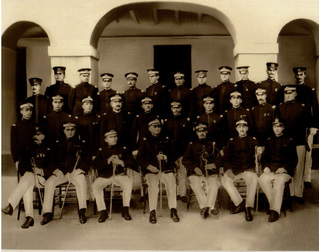 Officer Staff, "Porto Rico" Regiment, 1906.
Officer Staff, "Porto Rico" Regiment, 1906.
Here is an excerpt from the bills to award a Congressional Gold Medal to the 65th Infantry Regiment, known as the Borinqueneers (US House of Representatives H.R.1726 and US Senate S.1174):
“(22) Beyond the many hardships endured by most American soldiers in Korea, the Regiment faced unique challenges due to discrimination and prejudice, including--
(A) the humiliation of being ordered to shave their moustaches `until such a time as they gave proof of their manhood';
(B) being forced to use separate showering facilities from their non-Hispanic `Continental' officers;
(C) being ordered not to speak Spanish under penalty of court-martial;
(D) flawed personnel-rotation policies based on ethnic and organizational prejudices; and
(E) a catastrophic shortage of trained noncommissioned officers.”
During the Korean War, 2,771 Borinqueneers earned Purple Hearts. 750 of them were killed in action, and more than 120 are still missing in action. In addition to the points cited in the bills, the Borinqueneers were forced to wear “I am a coward” signs, ordered to paint over their unit designation “Borinqueneers” on their military vehicles, and ordered to discontinue their rations of rice and beans, termed “creole rations” at the time.
Among the national organizations supporting this important initiative are:
AARP, League of United Latin American Citizens (LULAC), Vietnam Veterans of America (VVA), American GI Forum (AGIF), Association of the United States Army (AUSA), Military Order of the Purple Heart (MOPH), National Puerto Rican Coalition (NPRC), National Puerto Rican Chamber of Commerce (NPRCC), National Guard Association of the United States (NGAUS), National Council of La Raza (NCLR), National Association for Uniformed Services (NAUS), and Hispanic American Police Command Officers Association (HAPCOA).
In an August 23rd letter from LULAC to Members of Congress, LULAC national president Margaret Moran stated, “It is with great pleasure that LULAC supports the 65th Infantry Regiment in their quest to achieve the Congressional Gold Medal, the nation’s highest civilian honor. Therefore, we urge you to Co-Sponsor the pertinent 65th Infantry legislation requesting the auspicious CGM recognition, Congressional bills H.R. 1726 or S. 1174. The Congressional Gold Medal will be the highest award ever for the 65th Infantry Regiment and for ALL Latino Veterans. This distinction will catapult Hispanic veterans into the national spotlight and will honor all Hispanic veterans past, present and future.”
Although comprised mainly of Puerto Ricans, during the Korean War, the Borinqueneers also included some Mexican-Americans, African-Americans, Filipinos, Virgin Islanders, and several other nationalities. Interestingly, our nation’s first and only Latino 4-Star Army general, Richard E. Cavazos, a Mexican-American, got his start as a young Borinqueneer officer in Korea. There he earned his first of two Distinguished Service Crosses, our nation’s second highest honor for individual heroism.
“(22) Beyond the many hardships endured by most American soldiers in Korea, the Regiment faced unique challenges due to discrimination and prejudice, including--
(A) the humiliation of being ordered to shave their moustaches `until such a time as they gave proof of their manhood';
(B) being forced to use separate showering facilities from their non-Hispanic `Continental' officers;
(C) being ordered not to speak Spanish under penalty of court-martial;
(D) flawed personnel-rotation policies based on ethnic and organizational prejudices; and
(E) a catastrophic shortage of trained noncommissioned officers.”
During the Korean War, 2,771 Borinqueneers earned Purple Hearts. 750 of them were killed in action, and more than 120 are still missing in action. In addition to the points cited in the bills, the Borinqueneers were forced to wear “I am a coward” signs, ordered to paint over their unit designation “Borinqueneers” on their military vehicles, and ordered to discontinue their rations of rice and beans, termed “creole rations” at the time.
Among the national organizations supporting this important initiative are:
AARP, League of United Latin American Citizens (LULAC), Vietnam Veterans of America (VVA), American GI Forum (AGIF), Association of the United States Army (AUSA), Military Order of the Purple Heart (MOPH), National Puerto Rican Coalition (NPRC), National Puerto Rican Chamber of Commerce (NPRCC), National Guard Association of the United States (NGAUS), National Council of La Raza (NCLR), National Association for Uniformed Services (NAUS), and Hispanic American Police Command Officers Association (HAPCOA).
In an August 23rd letter from LULAC to Members of Congress, LULAC national president Margaret Moran stated, “It is with great pleasure that LULAC supports the 65th Infantry Regiment in their quest to achieve the Congressional Gold Medal, the nation’s highest civilian honor. Therefore, we urge you to Co-Sponsor the pertinent 65th Infantry legislation requesting the auspicious CGM recognition, Congressional bills H.R. 1726 or S. 1174. The Congressional Gold Medal will be the highest award ever for the 65th Infantry Regiment and for ALL Latino Veterans. This distinction will catapult Hispanic veterans into the national spotlight and will honor all Hispanic veterans past, present and future.”
Although comprised mainly of Puerto Ricans, during the Korean War, the Borinqueneers also included some Mexican-Americans, African-Americans, Filipinos, Virgin Islanders, and several other nationalities. Interestingly, our nation’s first and only Latino 4-Star Army general, Richard E. Cavazos, a Mexican-American, got his start as a young Borinqueneer officer in Korea. There he earned his first of two Distinguished Service Crosses, our nation’s second highest honor for individual heroism.
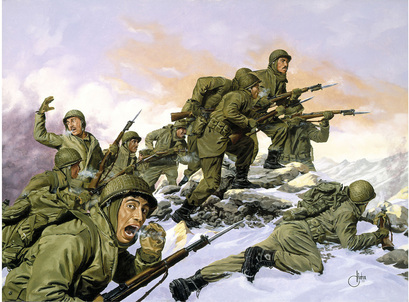 "Fijar bayonetas!" Click on painting to enlarge!
"Fijar bayonetas!" Click on painting to enlarge!
The Borinqueneers are credited with the final regimental bayonet assault in US Army history. In early 1951 while fighting in Korea, two battalions of the 65th fixed bayonets and charged straight up hill toward the enemy, over running them and overtaking the enemy’s strategic position. General Douglas MacArthur had high praise for the segregated unit.
It was recently learned that MacArthur several years earlier had tried to get the Borinqueneers assigned to him in the Pacific during WWII, but the Pentagon denied his request because of prejudice toward the 65th.
Also during Korea, the Borinqueneers valiantly defended the rear-guard of the retreating 1st Marine Division in one of the epic military withdrawals of history and were the last ones to board the retreating ships at Hungnam.
Another interesting fact is that of the 155 Congressional Gold Medal recipients since 1776, only one has been a Latino-American. That was forty years ago.
Even though this will be a first for many of us, the alliance is asking everyone to immediately contact your two U.S. Senators to request their Co-Sponsorship of the bills that would award the Congressional Gold Medal to the 65th Infantry Regiment Borinqueneers.
Information on how to identify and quickly and easily contact your Senators via phone calls, letters, or their email web forms is available here. Thank you!
It was recently learned that MacArthur several years earlier had tried to get the Borinqueneers assigned to him in the Pacific during WWII, but the Pentagon denied his request because of prejudice toward the 65th.
Also during Korea, the Borinqueneers valiantly defended the rear-guard of the retreating 1st Marine Division in one of the epic military withdrawals of history and were the last ones to board the retreating ships at Hungnam.
Another interesting fact is that of the 155 Congressional Gold Medal recipients since 1776, only one has been a Latino-American. That was forty years ago.
Even though this will be a first for many of us, the alliance is asking everyone to immediately contact your two U.S. Senators to request their Co-Sponsorship of the bills that would award the Congressional Gold Medal to the 65th Infantry Regiment Borinqueneers.
Information on how to identify and quickly and easily contact your Senators via phone calls, letters, or their email web forms is available here. Thank you!
Mambo on Hill 167
“Many officers at the time thought it was the kiss of death to be assigned to the Puerto Rican Regiment. Critics called it the “seeeexty feeeeth” mockingly imitating the Spanish accent of most of the regiment’s Puerto Rican soldiers.” |
 Click on photo to enlarge! Click on photo to enlarge!
Quotes from Mambo on Hill 167, a captivating story of heroism & sacrifice despite prejudice, by Bart Soto, alliance national steering committee member, author, & historian.
Follow this link to read the story & learn more about the legendary 65th Inf. Reg. Borinqueneers in our Special Hispanic Heritage Report! |
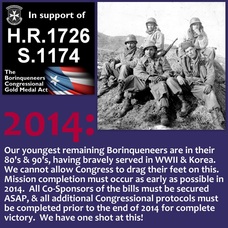 This MUST be the year! Click visual to enlarge!
This MUST be the year! Click visual to enlarge!
2014 ALERT!
SUCCESSFUL MISSION COMPLETION is essential in 2014, or the bills in Congress will disappear. YOUR HELP is needed NOW!
Go directly to our current major objective!
Thank you!
SUCCESSFUL MISSION COMPLETION is essential in 2014, or the bills in Congress will disappear. YOUR HELP is needed NOW!
Go directly to our current major objective!
Thank you!
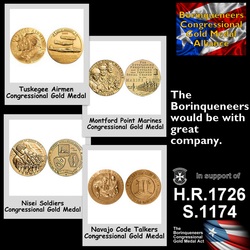 Click on visual to enlarge!
Click on visual to enlarge!
The BORINQUENEERS would be with great company...
"We will NOT allow the legendary Borinqueneers to become a fading footnote in American history and in the history of Latino-Americans and Puerto Ricans in the US."
--Borinqueneers Congressional Gold Medal Alliance volunteer
The Borinqueneers have merited the Congressional Gold Medal!

Click on visual to enlarge!
They paid a high price for our freedom. NOW IT'S TIME WE PAID THEM BACK JUST A LITTLE. Hailing from Puerto Rico, the Borinqueneers were the largest, longest-standing, and only active-duty segregated Latino-American military unit in US history, having fought bravely in WWI, WWII, & Korea. They endured the hardships of segregation & discrimination while at the same time being heroes in battle. Honor them. Thank you!
Get your "marching orders"!
Get your "marching orders"!
See and/or Download 1-Page Historical FACT SHEET!
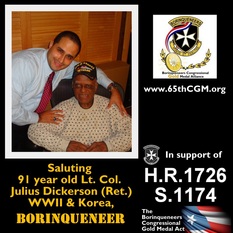 Click on LTC Dickerson visual to enlarge!
Click on LTC Dickerson visual to enlarge!
He found a home with the Borinqueneers in Korea when he was assigned to the 65th due to prejudice...
Julius Dickerson (LTC ret.), 91, graduated from Howard University as an architect. A WWII & Korea veteran, this African-American was an artillery officer, and served as the executive officer for the Borinqueneers Artillery “Cannon” company in Korea. He also designed encampment layouts for the 65th Inf. Reg. Borinqueneers.
Pictured: Borinqueneers Congressional Gold Medal Alliance national chair Frank Medina at a recent meeting with Lt. Col. Dickerson.
During Korea, although predominantly Puerto Rican, the Borinqueneers included some members of other nationalities, including African-Americans, Mexican-Americans, Filipinos, Virgin Islanders, & several others.
Julius Dickerson (LTC ret.), 91, graduated from Howard University as an architect. A WWII & Korea veteran, this African-American was an artillery officer, and served as the executive officer for the Borinqueneers Artillery “Cannon” company in Korea. He also designed encampment layouts for the 65th Inf. Reg. Borinqueneers.
Pictured: Borinqueneers Congressional Gold Medal Alliance national chair Frank Medina at a recent meeting with Lt. Col. Dickerson.
During Korea, although predominantly Puerto Rican, the Borinqueneers included some members of other nationalities, including African-Americans, Mexican-Americans, Filipinos, Virgin Islanders, & several others.
